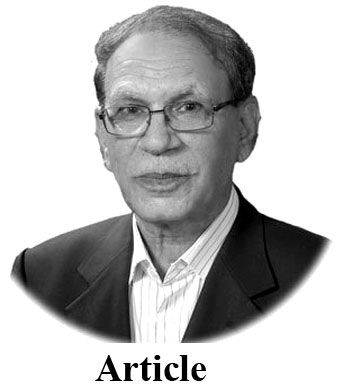Mohammad Jamil
IN the “lost decade” of 1990s, PPP and PML-N remained involved in internecine conflict; they formed alliances to get rid of each other’s elected government twice, which culminated in Martial Law in October 1999. Since 2008, both parties completed their 5-year tenures, but due to their flawed policies and corrupt practices they brought the resourceful country to the present pass. In 2018 elections, Pakistan Tehrik-e-Insaf emerged as a single majority party but had to make coalition government as it did not have the numbers. Though PTI had been against the loans from the IMF, but due to dwindling foreign exchange reserves and a debt mountain it had to approach the IMF. It had no choice but to accept conditionalities such as devaluation of currency and increase in the rates of utilities. The multiplier effect led to cost-push inflation and people have to pay more for everything.
But this crisis is of our own making, as apart from corruption by some political leaders, many members of business community indulged in evasion of customs duties and taxes. A Pakistan Business Council (PBC) research had reported about the variances and under-invoicing of imports between Pakistan and other trading partners including China, UAE and other countries. According to a recent report, China exported goods worth $12 bn whereas according to SBP the figure of imports was $6 bn, meaning the difference was paid through hundi. It is important to realize that the IMF and World Bank are tools for powerful entities in society and big powers. In fact, the IMF is driven by many factors, including the dictates of its larger shareholders – big powers – to promote their own security and economic goals and financial interests. Instead of being helpful in restoring long-run viability of the economy, the IMF is responsible for worsening the situation.
It is a universal truth that no nation can be independent and sovereign in the real sense of the term if it is economically dependent on others. It goes without saying that to formulate and pursue an independent foreign policy, a country has to have a strong economy, which is a precondition for strong defence. There is consensus among patriotic elements and right-thinking economists that our nation cannot progress till the time our economy depends on the handouts from international lenders and donors. Our foreign policy has been susceptible to manipulations because of internal political and economic instability brought about by callous policies of successive irresponsible and corrupt governments. They had mortgaged our children’s future and short-changed our dignity by joining the defence pacts with the West. Then in late 1970s and early 1980s they made Pakistan a frontline state against Soviets that had serious implications for the country.
After 9/11events, Pakistan was coerced into joining the war on terror; in the first place because of our past cooperation with the US, and secondly because of the dependency syndrome. In fact, the policies and recipes given by the IMF and the World Bank strangulated our economy and adversely impacted the capacity of the ordinary citizen to live a life of dignity. Pakistan therefore should strive for self-reliance, which is possible since Pakistan is a resourceful country. It is not implied here that we should isolate ourselves from the global economy but to strive for self-reliance through diligent use of resources, by mobilizing the people and harnessing their potential for a better tomorrow. However, it has to be understood that the best of economic revival plans cannot succeed so long as human beings are treated as statistical numbers.
Through equitable economic growth and by ensuring socio-economic justice in the society, poverty can be alleviated. But sustained economic growth is linked to political stability, which in turn can attract investment, thus generating greater revenues enabling it to invest in human and physical infrastructure development so essential to improve the productive capacity of the economy. Of course, economic strength is an indispensable condition to strong defence, which can guarantee the integrity, stability and sovereignty of the country. It is true that Pakistan’s security environment remained perilous particularly in view of India’ attempts to use the international environment emanating from post-9/11 events. Moreover, the threats Pakistan faces have to be understood in the light of the fast changing regional and international situation. These threats add urgency to revive the economy so that adequate resources could be allocated to thus enabling the government to meet those challenges and threats.
It is unfortunate that some so-called historians and economists criticized allocation of funds for defence. Those ignorant people do not understand that with hostile neighbours at eastern and western borders, how can we relent and relax? PM Imran Khan has invited the attention of international community that India is planning another false flag operation in Pakistan to divert the attention from the violence and protests it is facing in many of its States. UN Security Council members held rare talks on the disputed region of Kashmir on Wednesday amid ongoing concerns over the flashpoint between the nuclear-armed rivals India and Pakistan. After the meeting, senior Russian diplomat Dmitry Polyanskiy said the 15-nation body had discussed the contentious India-administered region, where New Delhi has been accused of human rights abuses mostly against its Muslim population.
—The writer is a senior journalist based in Lahore.










